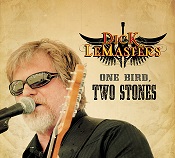 Ok, some life lessons for music lovers from tonight. First, if you get a chance to go and see a band (even on a school night), do it, because life’s too short. Second, when a mate recommends a band, go and see them. Third, the escalator at Angel station is the longest on London Underground and I’m not getting any younger; running up any escalator is for the young and fit, as I discovered. So, pulling all of this together, my mate Paul in Middlesbrough (closely followed by Graeme Wheatley from The Little Devils) told me I should have a look at The Jar Family, who were playing at The Islington.
Ok, some life lessons for music lovers from tonight. First, if you get a chance to go and see a band (even on a school night), do it, because life’s too short. Second, when a mate recommends a band, go and see them. Third, the escalator at Angel station is the longest on London Underground and I’m not getting any younger; running up any escalator is for the young and fit, as I discovered. So, pulling all of this together, my mate Paul in Middlesbrough (closely followed by Graeme Wheatley from The Little Devils) told me I should have a look at The Jar Family, who were playing at The Islington.
The Jar Family is another example of a group of people who have realised that the music business as we knew it doesn’t exist now. A bunch of players and songwriters from the Hartlepool area decided that the best way to get their songs heard was to work together as one unit drawing on the creative input of all the members. After a lot of hard work and personal sacrifice, they’ve come up with something really special which Teesside has known about for a while and the rest of the country is just beginning to catch up with.
The band members are: Max Bianco (vocals, guitar, harmonica, percussion), Dali (vocals, guitar, slide guitar, percussion), Richie Docherty (vocals, guitar, percussion), Chris Hooks (vocals, lead guitar), Keith Wilkinson (bass, vocals) and Kez Edwards (drums). If that sounds like a lot going on, it’s even busier when you put them on a stage, with the look of a Victorian street gang infiltrated by Tim Burgess. There’s a lot of movement between songs as the three singers take turns centre stage and guitars are swapped around, but it’s smooth and professional in a way that reflects the amount of work they’ve put in over the last few years.
The set opens with the latest single “In the Clouds” and rattles through a mainly uptempo set including “World’s Too Fast”, “Machine”, “In For a Penny”, “Footsteps”, “Paint Me a Picture”, “She Was Crying”, “Moya Moya” and “Tell me Baby” before a two-song encore of “Debt” and the appropriate closing stomper “Have to Go”. There are plenty of committed fans in the audience who have made the journey down from the North-East but by the end of the set, the rest have been won over as well by a combination of a varied bunch of songs delivered in ever-changing instrumental settings by a very tight and solid group of musicians, but that still doesn’t tell the full story of The Jar Family’s appeal and why they’ve built up such a fanatical following so far.
There are a couple of things that single this band out from the crowd. The band members interact with their audience on and off stage in a way that creates a shared experience; this isn’t about us and them, it’s about everyone together. The other thing is the songs; they’re accessible (whether they’re raucous or quietly melodic) and the lyrics deal with themes that most of us can relate to our daily lives. When you put a group of people like us on stage singing songs that could be about us, it’s a difficult combination to resist, particularly when the vocal and instrumental performances are so good. I understand what all the fuss is about now.
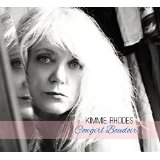 So, Kimmie Rhodes. Singer-songwriter, former Willie Nelson collaborator and duet partner and generally overlooked talent from way back when, she has been quietly taking care of business by writing, recording and performing since 1981 without ever achieving the recognition she deserves. Well, maybe now is the time to put that right. On “Cowgirl Boudoir”, Kimmie works with multi-instrumentalist Johnny Goudie, producer Gabriel Rhodes and Sunbird Studios house band to create a poignant, forthright and sometimes achingly beautiful set of songs that deserve a wider audience. And it’s not just a collection of songs, the album has a narrative which flows from the hauntingly world-weary opening duet, “I Am Falling” with Johnny Goudie to the positive and uplifting closer, “Yes”.
So, Kimmie Rhodes. Singer-songwriter, former Willie Nelson collaborator and duet partner and generally overlooked talent from way back when, she has been quietly taking care of business by writing, recording and performing since 1981 without ever achieving the recognition she deserves. Well, maybe now is the time to put that right. On “Cowgirl Boudoir”, Kimmie works with multi-instrumentalist Johnny Goudie, producer Gabriel Rhodes and Sunbird Studios house band to create a poignant, forthright and sometimes achingly beautiful set of songs that deserve a wider audience. And it’s not just a collection of songs, the album has a narrative which flows from the hauntingly world-weary opening duet, “I Am Falling” with Johnny Goudie to the positive and uplifting closer, “Yes”.
With “Cowgirl Boudoir”, you get a lot of bang for your buck. There are fourteen songs on the album and absolutely no filler; every song is there on merit. It’s fair to say that there aren’t too many cheerful little toe-tappers but the songs are well-constructed, beautifully played and sung from the heart. There’s a theme which runs through the album; about half of the songs are about dysfunctional and flawed relationships, but that’s not really news in the singer-songwriter genre or in country music generally, is it?
Musically, the core of the studio band is Kimmie Rhodes (vocals, guitar), Johnny Goudie (vocals, guitar, piano), Gabriel Rhodes (just about everything), Dony Winn (drums, percussion) and Glen Fukunaga (bass) with the seasoning supplied by Jolie Goodnight (backing vocals), Tommy Spurlock (steel guitar, Dobro) and Stephano Intelisano (keyboards). The musical settings emphasise the mood of each song on the album, from the plaintive steel guitar of the opening track and “Lover Killing Time” to the uplifting piano on “Me Again” and folksy feel created by mandolin and guitar on “Always Never Leave”. Not forgetting the psychedelic feel of the electric sitar on “The Sky Fell Down” and the Hammond B3 filling out the mid-range of “Worthy Cause”.
The lyrics are deceptively simple; they sound very straightforward, but they’re actually very well-crafted. “Me Again” uses themes and characters from fairy stories and fables to evoke childhood, and buying “Eight Days a Week” to represent a rite of passage into adulthood and music, while “Trouble Is” has the listener trying to work out what trouble actually is before working out that trouble just is. And I could go on, but the best bet is for you to have a listen for yourself.
“Cowgirl Boudoir” is out now on Sunbird Records (SBD 0021) and you can see Kimmie Rhodes on tour here.
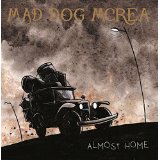 Mad Dog Mcrea hail from Plymouth, Devon and comprise: Michael Mathieson – guitar & vocals, Dan Crimp – whistles & flute, Jimi Galvin – bass, Dave Podmore – Bazooki & banjo, Pete Chart – drums & Nicki Powell – Fiddle. But that line up of instruments doesn’t even begin to describe the rich fruitiness of the energetic soundscape they create.
Mad Dog Mcrea hail from Plymouth, Devon and comprise: Michael Mathieson – guitar & vocals, Dan Crimp – whistles & flute, Jimi Galvin – bass, Dave Podmore – Bazooki & banjo, Pete Chart – drums & Nicki Powell – Fiddle. But that line up of instruments doesn’t even begin to describe the rich fruitiness of the energetic soundscape they create.
A heady punch of mainly uptempo folk, acoustic rock, gypsy strains of bluegrass and jazz touches, with some Brit humour and delivery. They also have some rock’n’roll anecdotes and a buccaneering approach to music, throwing lots of influences into the pot and creating something very listenable from it. They have a good reputation as a live gigging band, having done at least their fair share of festivals and are currently on tour;” Almost Home” translates their live energy well to digital. I don’t know who the writing talent is in the band but the overall sound is very collaborative throughout. The arrangements aren‘t necessarily straight-ahead but they are not meandering either. Sean Lakeman takes credit for the even and bright production.
As well as local nods (“Devonside”) and peopled by gangsters, pirates, faeries and gypsies and the themes are quite diverse from the tunnellers of WWI(“You Can’t Find Me”) to the comically romantic “Cher”.
Overall it’s a good listen that entertains and uplifts. I should imagine this would be a good drinking soundtrack, though there are cautionary tales about alcohol use, and a tinge of melancholy, “The Sound”, for home time.
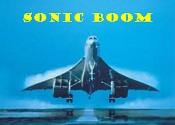 OK, so it’s about time we started another one of our occasional features. How about digging out those albums that had an instant impact on us and maybe even changed our musical tastes and lives. It could be something which went on to sell millions or it could be selling for 50p in the Oxfam shop (or both), but it was an album that made a difference. It was an album that made you see things in a different light and an album that you can drop the stylus on today, or stick in the CD player and it still makes you feel good. Oh, and you can listen to it from start to finish without skipping any tracks.
OK, so it’s about time we started another one of our occasional features. How about digging out those albums that had an instant impact on us and maybe even changed our musical tastes and lives. It could be something which went on to sell millions or it could be selling for 50p in the Oxfam shop (or both), but it was an album that made a difference. It was an album that made you see things in a different light and an album that you can drop the stylus on today, or stick in the CD player and it still makes you feel good. Oh, and you can listen to it from start to finish without skipping any tracks.
We’ll give you a starter for ten in the next couple of days and the Riot Squad will throw in the occasional contribution after that, but from that point on, it’s up to you. We want to hear about your personal album epiphanies; the impact they had when you first heard them and the effect they still have on you. We’re going to be asking for contributions from artists we’ve featured on Music Riot in the past and artists we’re hoping to feature in the future and anyone else who feels like having a go at enthusing about an album which influenced them.
Sound good to you? Watch this space and, if you feel like it, tell us about your Sonic Boom.
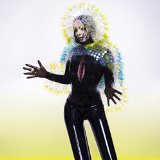 ‘How will I sing us out of this sorrow?’
‘How will I sing us out of this sorrow?’
Following eight albums that have all been conceptual to varying degrees and have covered such themes as introversion, extraversion, the voice as a multi-instrument and musical nature via apps it is both shocking and affecting to experience Bjork’s latest subject, herself and her family. Bjork, artist Matthew Barney and their children have demonstrated ably that is possible to retain privacy no matter however big your star may be and however hard a brutal media tries to prick it. With “Vulnicura” then a massive rupture has occurred to the point where Bjork specifies which songs on the album relate to which periods in the relationship when the rot began to set in for her and Barney, who are now most definitely separated following over a decade together as a kind of exotic, unattainable art couple. The fact that this album originally appeared two months earlier than its intended release date, because of a full online leak, and with no promotional material only added to the voyeuristic tingle and brutality of the unexpected openness that Bjork allows us.
There is no return to left-field pop or immediate accessibility on “Vulnicura”. The majority of the nine tracks are well over six minutes long; “Black Lake” is just over ten, and there are surprising nods to her late nineties material throughout. There are some gorgeous melodies here but the album is structured, and to a large extent sounds exactly like, a classical piece, which is primarily due to the return of gigantic, stirring and occasionally violent string parts – only the shortest track does not feature an orchestra. Opening track for example, “Stonemilker”, set ‘nine months before’, is lush, stately and warmly reassuring and suggests little unrest. But the first audible line ‘moments of clarity are so rare, I’d better document this’ indicate frustration and the interruption of stability.
“Lion Song” opens with the kind of stacked-up and distorted accapellas first heard on “Medulla” but this is not an indication of what follows. ‘Maybe he will come out of this (loving me), maybe he won’t, somehow I’m not too bothered either way’ is a typically poetic, plain-speaking Bjork lyric and forms the sweeping and woozy, eastern-influenced chorus; the friendliest on the album. This is tied together by verses that are led by the string arrangements and which dip and dart broadly in a style most resembling a cautionary show tune. “History of Touches” accounts the last time a couple sleep together following years of unity and togetherness. It’s probably the saddest song here and is beat-less with ethereal but zig-zagging synths supporting an accepting and almost disconcertingly confident vocal.
“Black Lake” is the eye of the storm, ‘my shield is gone, my protection is taken’. Lines are sung in a plaintive, near-defeated way before string notes are drawn out for up to almost 30 seconds to seemingly allow Bjork to recompose and continue. Straightforward songwriting and exquisite orchestration dominate and at one point beats threaten to take the mood elsewhere but such interruptions are premature and silenced by violins. Devastating but restrained, it is Bjork playing to all her strengths.
The second half of the album, songs that deal predominantly with the post-relationship period, has several tortured, schizophrenic movements that are contained within the songs themselves. “Family” and “Notget” are “Vulnicura”’s most difficult tracks and also provide some of its most artful and sonically visceral moments. Fully immersed in rage, bewilderment and the almost liberating feeling of letting go of something that has ended, however paining. “Family” opens with the astonishing line ‘is there a place that I can show my respects for the death of my family?’ and is musically ominous, becoming increasingly terrifying. Both these songs are co-written and produced by Arca and are where his presence is most felt, those however expecting “Vulnicura” to sound like an Arca record with Bjork vocals will be disappointed. The creaking and constantly erupting beats and soundscapes, overall, still sound more or less as they always have done – like a Bjork record. The final third of the album is about recovery, friendship and moving forward and final track “Quicksand”, all luminous electronics, staccato strings and drum and bass, speaks about the future of women and the need to accept adversity as well as joy.
“Volta” and “Biophilia”, albums that immediately proceeded this, were often deliriously chaotic, cryptic and for the most part interesting, but lacked the essential emotional core that has grounded all of Bjork’s work; on “Vulnicura”, we are again back on steady ground. With her career retrospective at the MOMA, spanning the last twenty years of her work, it is both a relief and a genuine thrill to have one of pop’s most important, explosive and influential stars making music that again matches, and in places surpasses, her best. Bjork has, as she has always done, followed her heart in order to heal her heart and never has this sounded as critical as on “Vulnicura”. Singing her way out of sorrow is instinctual and much more than a career move, it has helped save her and for that we should be grateful.
This is a very likeable album. The title track, for a start. Just the title defines a bad day at the office.
Given the fact that the guy is from Texas, is quite old, plays Texan country-tinged bluesy rock n roll, has got a beard and has a song on the album about a Buick you are dragged kicking and screaming towards the conclusion that this is going to be infused with more than a tad of ZZ Top, sold as seen, if you like. And indeed there is.
But it isn’t quite that simple.
The album leaps out of the box with the incendiary “Three Fifty Seven”, a snarling ‘death row’ blues with raw chunks of harmonica from Dan Moser, just one of a number of damn fine players featured on this album, which is as bitter and scary in the lyrics as it is raw and jagged in the playing. “Power in the Snake” has lyrical nods to Steve Earle but for me, you could hand that song to George Thorogood and the Destroyers tomorrow and they’d do a job on that for you.
He does a tidy line in ironic lyrics as well, with “The Wages of Sin” sounding quite ‘churchy’, on the surface, but actually, not. “Pestilence and Locusts”sounds a bit like a Crazy World Of Arthur Brown B side as song titles go but actually it’s a rather sad, rather bitter ditty about what happens when ‘the thing you love most becomes the thing that drags you down’.
And ‘Big Ol Buick’ does what it says on the tin and is an enjoyable listen.
And already you can sense a ‘But….’, right?
So what stops this from being the kind of album you ring up your mate and say ‘you’ve REALLY got to hear this…’ always assuming your mate is into that sort of ‘Americana’ thing, which in my view all right-thinking people should be.
Well, conveniently for me, Mr. LeMasters has been asked to review his own album by his PR man. And this is what he says.
‘I write songs with the intent that they will be songs that I perform at my shows. If ever I write a song which is good enough and it gets heard by the right person, some big-time singer might record it…’
And at this level, this all works just fine. You could take this bunch of songs out on the road in the good ol’ US of A in the bars, clubs and roadhouses and they’d work perfectly fine with the voice of Dick LeMasters doing the honours. The album has some very fine new songs, the songs are extremely well played (there is some really nice guitar and harmonica work on this, it really is a joy in places; I mean, “River Blues” is really rather special, for example) but his voice really is an adequate tool for carrying the songs and nothing more. So, and by the guy’s own admission, this works pretty damn well as a demo for his songs, a shop window for ‘big-time’ singers to check out his wares. And for his sake and for the sake of an extremely enjoyable if not exactly fashionable music genre, I hope someone does. At the very least he deserves a round of applause for not deciding to spend the rest of his life knocking out ZZ Top covers when no doubt he could.
But there’s your problem. Well, his, anyway – and the reason why this is a tough one to review.
Apart from the fact he’s already written his own review with candour and accuracy.
3.5 Stars out of 5.
Self-released and out now.
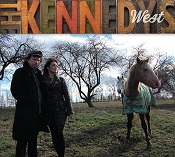 It’s great to see that after twenty years together, Pete and Maura Kennedy are celebrating by releasing three albums in 2015, following the live Nanci Griffith set and Pete’s solo instrumental album last year. I can’t think of a more compact, complete and self-sufficient creative partnership than Pete and Maura. As live performers, they both sing beautifully, with Maura generally leading while Pete supplies perfect harmonies. Instrumentally, Maura provides the rhythm guitar backdrop while Pete plays lead lines to complement the songs and occasionally gets the chance to demonstrate his mastery of guitar and several more (mainly) stringed instruments. They’re both fine songwriters together and individually who aren’t afraid to include songs by other writers with their own material. This might all sound a bit general, but all of this applies to the duo’s latest studio album, “West”.
It’s great to see that after twenty years together, Pete and Maura Kennedy are celebrating by releasing three albums in 2015, following the live Nanci Griffith set and Pete’s solo instrumental album last year. I can’t think of a more compact, complete and self-sufficient creative partnership than Pete and Maura. As live performers, they both sing beautifully, with Maura generally leading while Pete supplies perfect harmonies. Instrumentally, Maura provides the rhythm guitar backdrop while Pete plays lead lines to complement the songs and occasionally gets the chance to demonstrate his mastery of guitar and several more (mainly) stringed instruments. They’re both fine songwriters together and individually who aren’t afraid to include songs by other writers with their own material. This might all sound a bit general, but all of this applies to the duo’s latest studio album, “West”.
The eponymous opener, “West”, is a mid-tempo country rock exploration of a theme which dates back to eighteenth century, moving west as voyage of discovery. It just happens to have the most insanely catchy one-word chorus you’re ever likely to hear. As openers go, a road song with the perfect chorus is a pretty good start. “Elegy”, the second song in, is a folk-tinged celebration of the work of American folk singer-songwriter Dave Carter featuring banjo, mandolin, and even dulcimer from Pete. “Sisters of the Road” is a celebration (that word again) of the female voice and the bond between the sisterhood of performers who criss-cross the USA (and the rest of the world) meeting up whenever their schedules happen to coincide. “Signs” has a very 60s psychedelic folk feel with some electric sitar from Pete and a lyric inspired by a week spent by Maura in the New England woods. The mid-tempo country feel of “Jubilee Time” features a lead vocal from Pete and the uplifting message that however bad things are , they can always get better: ‘And when you’re standing with your hat filled with rain, Just remember that we will meet again’. And this may just say more about my record collection than anything else, but it reminds me a lot of Bob Seger’s “Fire Lake”.
From the opening low-register guitar intro, it’s obvious that “Locket” is inspired by Buddy Holly. It’s musically very simple, and lyrically it’s built around a metaphor of a locket representing a heart; simple but hugely effective. It also alludes to the genesis of Pete and Maura’s relationship twenty years ago, but that’s another story. “Southern Jumbo” returns to a country style, pulling together the themes of a family get-together for cooking and singing and a love song to a guitar and, again, it works perfectly. “Black Snake, White Snake” is a supernatural story of two sister snakes (one bad, one good) based on a piece by poet B.D. Love (who has also been collaborating with Maura on an upcoming album) with Pete’s sitar adding a psychedelic sound which emphasises the sinister tone of the piece.
“Bodhisattva Blues” is a flat-picked country blues pulling together concepts from Eastern and western religions sung in two-part harmony throughout and it’s great acoustic fun, while “Travel Day Blues” moves firmly into electric twelve-bar blues territory combining the legend of the Comte de Saint Germain with a list of some of the distractions that help to pass the hours spent moving from gig to gig. There’s also a nod in the direction of “Subterranean Homesick Blues” and proof that all Chuck’s children are still out there playing his licks. “The Queen of Hollywood High” is a tribute to a Kennedys favourite, the late John Stewart. It’s perfect West Coast pop and Pete and Maura are also helped out here by John’s former band members.
If you know anything about The Kennedys, you probably know that they are Byrds fans, so it should be no surprise that John Wicks of The Records wrote a song for (and about) them, “Perfect Love”, which they perform here. It’s a lovely song and works really well with Pete and Maura’s voices. And what better way to end the album with a twentieth anniversary love song from Pete to Maura with Everlys-style harmonies? “Good, Better, Best” isn’t a song about everything always being perfect, but about how the right person helps you deal with the inevitable bad times.
“West” is a gem of an album; thirteen varied and beautifully-crafted songs played and sung with taste and sensitivity by two very gifted people. There aren’t any instrumental or vocal pyrotechnics, just proper playing and singing; there isn’t anything here that isn’t absolutely necessary. Besides the themes of love, celebration and remembrance, there’s a bit of the supernatural and a light-hearted look at religious enlightenment and fulfilment; I haven’t heard a better album in a long time.
The album is self-released on May 13th 2015, but Pete and Maura will be happy to sell you a copy at any of the following tour dates in the UK:
April
Thurs 30 Glasgow Woodend Bowling & Lawn Tennis Club
May
Friday 1 Basingstoke, The Forge at The Anvil
Sunday 3 Birmingham, Kitchen Garden Café
Wednesday 6 Southport, Grateful Fred’s at The Atkinson
Thursday 7 Milton Keynes, The Stables
Friday 8 London, Kings Place
Saturday 9 Leeds, Seven Arts
Sunday 10 Haile, Cumbria Haile Village Hall.


